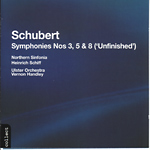This generously-filled Schubert disc features Heinrich Schiff leading engaging accounts of Symphonies Nos. 3 & 5. No. 3 benefits from a disarming sense of innocence and delight (enhanced by the beautiful woodwind playing), while Schiff brings to the Fifth a beguiling Mozartean grace that points up the first movement’s rhythmic similarities to Mozart’s Symphony No. 40. The smaller forces employed by the Northern Sinfonia allow its buoyant playing to ring clear and true in the lively acoustic.
The Ulster Orchestra sounds similarly scaled down for Schubert’s Eighth, with the effect being a lighter sound than we are used to in this music (especially compared to the Brucknerian sonorities Gunter Wand draws from the Berlin Philharmonic). This should make for greater incisiveness and impact, but Vernon Handley only makes partial use of this opportunity, seemingly not sure whether to emphasize the work’s classical grounding or its romantic yearnings. Harnoncourt’s version is a prime example of how to marshall both elements into a compelling whole. Still, Handley’s performance is enjoyable for its clear ensemble and first-rate playing. Chandos’ full-bodied, dynamically true recording makes the whole enterprise worth hearing.
































